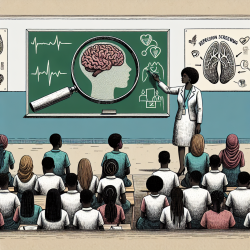Introduction
As a practitioner dedicated to improving outcomes for children with complex health conditions, staying informed about the latest research is crucial. The study titled Psychological Outcomes of a Cognitive Behavioral Therapy for Youth with Inflammatory Bowel Disease: Results of the HAPPY-IBD Randomized Controlled Trial at 6- and 12-Month Follow-Up offers valuable insights into how cognitive behavioral therapy (CBT) can be leveraged to support youth with inflammatory bowel disease (IBD). This blog post will delve into the study's findings and discuss how practitioners can apply these insights to enhance therapeutic outcomes.
Understanding the Study
The HAPPY-IBD study was a randomized controlled trial that investigated the effectiveness of disease-specific CBT in youth aged 10-25 years with subclinical anxiety and depression related to IBD. The study included 70 participants who were divided into two groups: one receiving CBT in addition to standard medical care, and the other receiving only standard medical care. Psychological outcomes were assessed at 6 and 12 months post-intervention.
Key Findings
- Both groups showed improvements in anxiety, depression, health-related quality of life (HRQOL), social functioning, coping, and illness perceptions.
- No significant differences were found between the CBT group and the standard care group in terms of psychological outcomes.
- The study hypothesized that the lack of significant differences might be due to the low burden of disease in participants or heightened awareness of psychological difficulties.
Implications for Practice
While the study did not find significant differences between the CBT and standard care groups, it highlights several important considerations for practitioners:
- Early Intervention: The study underscores the importance of addressing psychological symptoms early, even when they are subclinical. This approach can prevent the development of more severe psychological disorders.
- Comprehensive Care: Integrating psychological support with medical treatment can enhance overall patient care. Even if CBT does not show a significant difference in outcomes, it can still provide valuable skills for managing psychological symptoms.
- Tailored Interventions: Practitioners should consider individualizing treatment plans based on the severity of psychological and somatic symptoms. More intensive interventions might be necessary for those with higher disease activity or more severe psychological symptoms.
Encouraging Further Research
The HAPPY-IBD study opens the door for further research into targeted psychological interventions for youth with IBD. Practitioners are encouraged to explore additional studies and contribute to the growing body of evidence supporting the integration of psychological care in chronic disease management.
Conclusion
The HAPPY-IBD study provides valuable insights into the role of CBT in managing psychological symptoms in youth with IBD. By integrating these findings into practice, practitioners can enhance the quality of care and support the well-being of their patients. For those interested in exploring the original research paper, please follow this link: Psychological Outcomes of a Cognitive Behavioral Therapy for Youth with Inflammatory Bowel Disease: Results of the HAPPY-IBD Randomized Controlled Trial at 6- and 12-Month Follow-Up.










